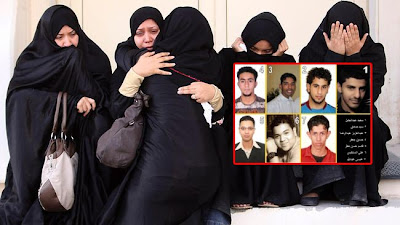Engineer Dirar Abu Sisi in the courtroom, handcuffed and between policemen. (Ma´an)
Dirar Abu Sisi, the engineer of Gaza´s only power plant, who was snatched from an Ukrainian train in february, was finally indicted on Monday in an Israeli court in Beer Sheba. The numerous question marks which hang over his kidnapping remain, however, now that the gag order over his ´arrest´ is partially lifted. One could even say that the indictement itself adds a number of new questions to the old ones.
For instance, the indictment does not mention anything about the Israeli soldier Gilad Shalit, about whom Abu Sisi was questioned at length, as he said himself, and as was also mentioned by Israel´s prime minister Netanyahu in a radio interview. Instead it paints a picture of Abu Sisi as a weapons expert and Hamas-militant. A secret militant that is, as nobody of his family, friends, or collegues ever saw a glimpse of a different Abu Ssisi than the one who lived for his family and for his work as an engineer of the power plant.
In the indictment Abu Sisi is nverthless accused of belonging to a militant group (Hamas) and of hundreds of counts of attempted murder and making rockets. It says that ´Abu Sisi is accused of nine charges regarding activity in a terrorist organization, hundreds of counts of attempted murder, conspiracy to commit murder and
arms production offenses´.
The story may have become even more mysterious, as the Israeli secret services now contend that Abu Sisi who did his PhD in electrical engineering in Ukraine, in fact enrolled in this Ukrainian PhD program in order ly to study ballistics. His PhD advisor was Constantine Petrovich, the Israeli agencies say, a supposed expert in the development of SCUD rockets.As the indictement says (translation from the Hebrew by Deena Shunra):
He intended] to take part in lessons and academic activity relating to ballistic weaponry and of having obtained extensive knowledge in the field of developing missiles and mechanisms for the control, propulsion, and stabilization of them.
Also it says that Abu Sisi was enrolled in the service of Hamas by two of its military experts, Nizar Rayan and Salah Shehadeh, who in the meantime both have been killed by Israel, so that nobody can ask them any questions anymore. (Rayan was killed during the ´Cast Lead´ campaign of 2009, and Salah Shehadeh in 2004 by the nightly dropping of a 1000 pound bomb on his flat, that also took the lives of 14 others - nine of them children).
Abu Sisi, after apparently having become Hamas´ ballistic number one, at least according to the Mossad and Shin Bet, took part in programs to improve the quality of several types of missiles. (I follow here the text on
Richard Silverstein´s blog Tikun Olam, Silverstein being somewhat of an expert in cases like this one:
The Accused did this [ran the Gaza power plant] within the framework of his membership of a committee headed by senior Hamas activists Muhammad Dief, which dealt in the development and improvement of various types of missiles and mortars, including the Qassem, Yassine, Albattar, Abu Rassine, and Albana.
Abu Sisi would have developped the Yassine anti-tank missile which would be capable of damaging Israeli armored personnel carriers, fins to stabilize the Al Battar missile and he would have transferred knowledge about Russian rocket research and development to Hamas.
Also
He developed the idea of establishing a military academy that would train the officers and commanding ranks in the Hamas for their functionality under warfare and took upon himself the task of establishing and managing the military academy…
The idea of this academy being born after Israel´s Cast Lead operation of 2008-2009 and sprung out of the conclusion that Hamas´s forces performed rather poorly against the Israeli´s at that time.
The strange thing about all these ´facts´, however, is that neither Abu Sisi´s sister who lives in Gaza, nor his brother who lives in Holland, or his wife Veronica who lives in Ukraine, or his closest collegues at the power plant (who were interviewed by Channel 10 in Israel) knew anything of the possibility that Abu Sisi might have known anything about weapons in general or more specifically about ballistics, nor that he was ¨politically involved, let alone a member of Hamas. It also remains strange that someone who is involved in weapons building and training programs in Gaza, makes a trip to Ukraine to prepare his application for Ukrainian citizenship. It does not seem to make sense.
However,
Ma´an reports that his Israeli lawyer, Smadar Ben-Natan, told journalists that her client had confessed to ´certain things´. She said she could not elaborate, because of court-imposed restrictions. She added that these confessions were made ´under very heavy duress which I would characterize as torture´.
Abu Sisi's family meanwhile told Ma'an that Dirar was abducted because he had been able to engineer a switch in fuel source for the Gaza Power Plant. At the close of 2010, the Gaza Strip halted its import of Israeli industrial diesel, and initiated a trial run using purified fuel brought in through the smuggling tunnels from Egypt.
Abu Sisi's sister Suzanne said ´Israel was provoked because my brother was able to operate the plant without fuel from their pumps, Israel tries to lay siege to us in every way, but they cannot lay siege to our brains and our creativity´´.
Suzanne said her brother was ´not linked in any way to any political faction, he was working as the head of the operations of the plant before Hamas came to power, and he continues his work as a university professor´.


.jpg)



























